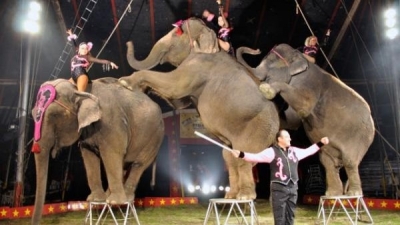
In a historic move, French lawmakers have voted to ban the use of wild animals such as tiger, lion, and bear in live circus shows. The legislation also bans the use of wild animals in television shows, nightclubs, and private parties. It intends to put an end to dolphin shows and mink farming as well in the coming years. The new law will raise the maximum penalty for mistreating animals to up to five years in prison and a fine of 75.000 Euros (approx Rs 62 lakh) and will tighten restrictions on the sale of pets. While a section of animal rights advocates welcomes the move, others have expressed disappointment that other controversial issues such as hunting, bull fighting, force feeding for foie gras and some animal-rearing practices have not been included within the scope of the legislation.
Like humans, animals and birds too deserve the right to life and freedom. Travel, confinement, and being forced to perform tricks deprive them of these rights. In turn, it affects their ability to satisfy their physical, emotional and behavioural needs.
Abuse and stress
- Animals such as bears, elephants, tigers, lions, camels, and monkeys are forced to perform demanding tricks Trainers use bullhooks, whips, electric prods, and other tools to make them perform. Beatings, punishment, and threatening are common. These put animals through a lot of stress. Countless suffer injury and pain. The same goes for aquarium animals such as sealions and dolphins that are made to perform tricks.
- Animals have also died from overheating in cramped cages and during transport between shows.
- During the show, the loud noise of the music, the cheers of the crowd, and the dizzying lights can disorientate them.
Poor living conditions
- Living spaces are cramped, often badly maintained and lack the basic comforts animals find in their natural habitat. In their natural environment such as forests, fields, rivers, lakes, and oceans, animals live a normal life roaming or swimming about hunting their own food, and interacting with other animals. But at circuses and other entertainment houses, they are confined to the four comers of a pen or an enclosure, leaving little room for free movement.
- For a tiger, a habitat is not just a place to live and prey in but also a place to congregate and to establish a sense of territory.
Tigresses also use the habitat to give birth to and raise cubs. A tigress will need a 20 sq.km. territory, while a male requires a larger territory, such as one that covers 60 to 100 sq.km.
Loneliness & separation
- Sea lions and elephants are highly social animals. Elephants live in herds of anywhere from eight to 100 individuals with the head of the herd being the oldest female. A circus life will present a lonely, isolated life, depriving them of their social interaction with and emotional dependency on each other.
- Intergenerational bonds are broken when individuals get uprooted from the wild.
- In addition to loneliness, captive dolphins face exposure to human infection, bacteria, and chemicals and suffer from stress-related illnesses.
Unsuitable weather and food
- Enclosures should maintain a temperature similar to the natural habitat. Ceiling panels, indoor pool, air-conditioning, sprinklers and ice blocks are to be made available for the animals to chill during hot weather.
- And each animal has its own specific food needs. For instance, adult elephants consume about 250 kg of food and require a minimum of 150 litres of water a day. It is not dear if a circus or a TV production house can provide these needs.
Foie gras is a French dish made with the liver of a duck or goose. Foie gras means fatty liver. To make this dish, the birds are force-fed using a feeding pipe inserted into the birds mouth, down its throat. A large quantity of food (usually corn with fat) is then delivered using a motorised pump. The birds are usually force-fed two or three times each day. This deposits large amounts of fat in the liver, which is preferred for the dish.
In 2018, the Central government of India notified the draft Performing Animals (Registration) (Amendment) Rules, 2018 proposing to prohibit performance and exhibition of all animals in circuses. But a law is yet to be passed. Though many circuses have shut business due to the COVID-19 pandemic, those that function have animals in possession.
Picture Credit : Google




